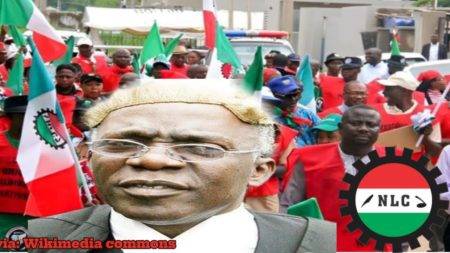Background of the Dispute Between NLC and Federal Government
The nationwide protest led by the Nigeria Labour Congress (NLC) has sparked controversy, with legal implications surrounding its adherence to court orders. In a letter addressed to the Federal Government, legal luminary Falana clarifies that the NLC’s protest does not constitute contempt of court orders. Falana emphasizes that the NLC’s challenge to the jurisdiction of the National Industrial Court (NIC) is pivotal in understanding the legality of their actions.
The crux of the matter lies in the NIC’s issuance of exparte orders restraining the NLC and Trade Union Congress (TUC) from organizing strikes against the removal of fuel subsidy. Despite compliance initially, both organizations swiftly moved to challenge the jurisdiction of the NIC, seeking to set aside the exparte orders. The legal maneuvering underscores the complexity of balancing labor rights with legal directives, setting the stage for a contentious legal battle.
Legality of Protest Actions of NLC
Falana asserts that Nigerians have the inherent right to engage in peaceful demonstrations without obtaining permits, particularly when addressing matters of public interest. This assertion challenges any notion that the NLC’s protest activities are in defiance of legal norms. By framing the protest within the context of fundamental rights to assembly and expression, Falana strengthens the argument for the legality of the NLC’s actions.
Furthermore, Falana highlights the absence of any explicit restraint on the NLC’s members from exercising their constitutional freedoms. Despite the NIC’s exparte orders, which the NLC and TUC initially adhered to, the subsequent legal challenges and ongoing dispute over jurisdiction cast doubt on the enforceability of these orders. The evolving legal landscape underscores the intricacies of labor rights in the face of governmental directives.
Court Proceedings and Settlement Attempts
The legal saga surrounding the NLC’s protest journeyed through the NIC, where the federal government sought injunctive relief to curb the planned strikes. However, the resolution of the dispute remains elusive, as parties engaged in settlement discussions while concurrently contesting the jurisdiction of the court. Despite signing a memorandum of understanding, the federal government’s failure to fully implement its terms contributed to renewed protests by the NLC and TUC.
The ongoing legal wrangling reflects deeper systemic issues concerning the balance of power between labor unions and governmental authorities. The failure to address grievances satisfactorily through legal channels has led to continued civil unrest, underscoring the importance of effective dispute resolution mechanisms in safeguarding labor rights and promoting social harmony.
The Clash Between NLC and the Federal Government; Impact on Public Discourse
The clash between labor unions and the federal government has ignited public discourse, with opinions divided on the legality and legitimacy of the NLC’s protest actions. Falana’s intervention adds a legal perspective to the debate, emphasizing the primacy of constitutional rights in the face of legal directives. The discourse extends beyond legalities to encompass broader socio-political implications, reflecting the complexities of governance and civic engagement in Nigeria.
As the dispute unfolds, the public remains engaged, with stakeholders closely monitoring developments and advocating for their respective positions. The intersection of law, politics, and public sentiment underscores the multifaceted nature of societal issues and the imperative of constructive dialogue in resolving conflicts.
Resolution or Escalation?
Amidst mounting tensions and legal uncertainties, the path forward remains uncertain. While legal avenues for dispute resolution exist, their efficacy hinges on the willingness of parties to engage in good faith negotiations. The failure to reach a satisfactory resolution risks further escalation of tensions, with potential ramifications for social stability and economic well-being.
Ultimately, the resolution of the dispute requires a concerted effort from all stakeholders to prioritize dialogue, compromise, and adherence to legal norms. Only through genuine engagement and mutual respect for constitutional rights can a sustainable resolution be achieved, paving the way for constructive collaboration and social progress.
Legal Luminary Falana’s Defense of NLC’S Right
Legal luminary Falana’s defense of Nigerians’ right to protest amidst nationwide unrest sheds light on the legal implications surrounding the dispute. By clarifying the legality of the protests in the context of fundamental rights, Falana challenges the notion of contempt of court orders, emphasizing the delicate balance between labor rights and legal directives. The ongoing legal battle underscores the complexities inherent in safeguarding constitutional freedoms while navigating legal frameworks, setting the stage for a nuanced resolution.
As the dispute continues, the importance of effective dispute resolution mechanisms becomes increasingly apparent. The failure to address grievances satisfactorily through legal channels has led to prolonged civil unrest, highlighting the need for constructive dialogue and compromise. Stakeholders must prioritize engagement in good faith negotiations to prevent further escalation of tensions and promote social harmony. Ultimately, a sustainable resolution can only be achieved through a collective commitment to upholding constitutional rights and fostering mutual respect, paving the way for constructive collaboration and societal progress.
Table of Contents
Discover more from OGM News NG
Subscribe to get the latest posts sent to your email.














